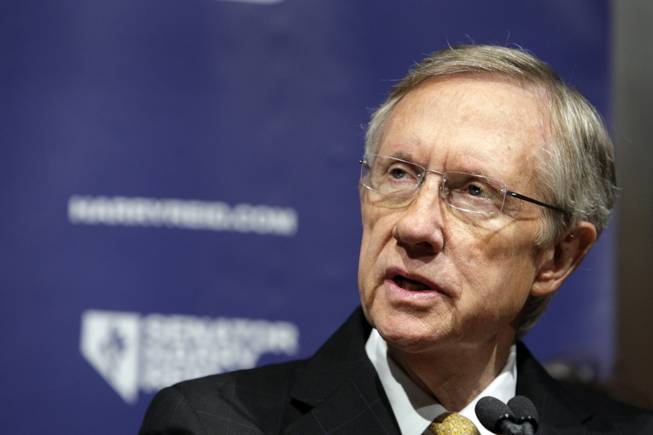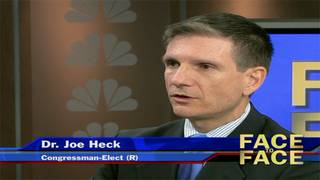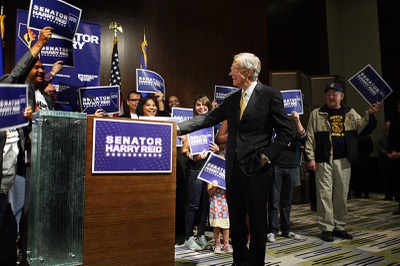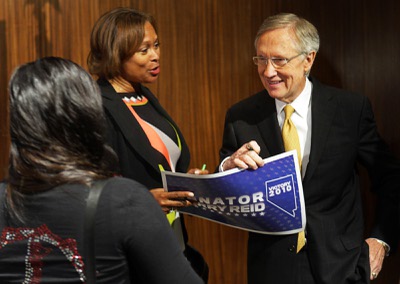
Senate Majority Leader Harry Reid said Wednesday, “The American people want us to work together.”
Thursday, Nov. 4, 2010 | 2 a.m.
Congressman-elect Joe Heck

Viewing video requires the latest version of Adobe's Flash Player
Reader poll
It’s no surprise that after witnessing a drubbing of Democrats in the House and significant losses in the Senate, the president and his majority leader are speaking about compromise.
Neither should it come as a shock that after reclaiming the House with their greatest majority since 1948, Republican leaders aren’t.
The refrain of postelection bipartisanship resurfaces every two years, and usually recedes just as quickly. But this year, Democrats have a serious stake in preserving a conciliatory atmosphere.
“The American people want us to work together,” Harry Reid said Wednesday morning, explaining what he learned from a 2010 election season that he survived, but many of his Senate colleagues didn’t.
“It’s not a bad word to suggest that legislating is the art of compromise,” he said.
As majority leader, it will fall to Reid to figure out how to advance President Barack Obama’s agenda, while protecting the work that has been done.
Republicans promised during the campaign to undo several Obama initiatives, starting with the health care overhaul they refer to as “Obamacare.”
“The new majority here in Congress will be the voice of the American people,” said House Speaker-elect John Boehner on Wednesday. “We’re determined to stop the agenda Americans have rejected and to turn the ship around.”
Reid is as skilled at steering and deflecting legislation as anyone in the Senate. He’s been the caucus leader through minorities to supermajorities, under Republican and Democratic presidents.
But Reid has never faced anything similar to the current situation. In fact, no Democratic Senate majority leader has.
In the near-100 year history of Senate majority leaders, no Democrat has faced a Republican House while simultaneously trying to execute a Democratic president’s policies.
One would have to look before the Civil War to even find a Congress where the parties occupied the positions in Congress and the White House that they will in 2011.
The new configuration may force Reid into a position he’s not used to — playing defense, from the majority side.
Throughout his tenure as majority leader, Reid has had the privilege of working with a cooperative House, led by Nancy Pelosi.
Pelosi and Reid established a rhythm early on: For the most challenging legislation, such as immigration reform and health care, the Senate would usually act first, that being where the most treacherous hurdles lay on the road to a bill’s passage.
The arrangement let Reid have, in most cases, the ultimate say on what was and was not feasible before significant pieces of legislation ever came up for a vote.
Reid won’t be able to call shots like that in the 112th Congress, with Republicans in half-charge of the legislative agenda. That could pose a problem for the senator, who spent much of the last Congress chiding Republicans for not simply blocking legislation, but never proposing alternatives.
“If they’re unwilling to work with us, there’s not a thing we can do about that,” Reid said again Wednesday.
Republicans repudiate that assessment.
“I think what the American people were saying yesterday is they appreciated us saying no to the things that the American people indicated they were not in favor of,” Boehner, an Ohio Republican said.
By midday Wednesday, Reid and Boehner still had not spoken to discuss the election results or plans for the future — although each seemed to have touched based with every other significant power broker in Washington, including the president.
Obama wouldn’t be the first Democratic president to try, and succeed, at reaching a cooperative detente with a House Republican leader, if he is able to do so: After an infamous shutdown of the government, Bill Clinton and Speaker Newt Gingrich eventually achieved a working relationship.
Obama appeared to take personal responsibility for the national election outcome Wednesday, and outlined areas where he thought there could be room for compromise, including education and energy.
For Obama, as was the case for Clinton, there is much at stake: In two years, he has to stand for re-election, and with a split Congress, it won’t be easy to put the full blame on Republicans if the economy doesn’t improve.
Twenty-one Democratic senators will also face voters. Although Reid’s political neck is no longer on the line, that’s a significant chunk of his now-reduced caucus whose political futures rest in part on his ability to chart a plausible path forward, especially on the economy.
That starts in the Senate, where the Republican Party has grown from barely enough for a filibuster, to occupying almost half the seats. New Tea Party-backed senators, who may yet take their cues from dutiful legislation blockers such as Sens. Jim DeMint and Tom Coburn, aren’t expected to make the caucus any more conciliatory.
It’s also not clear if Reid, empowered by beating back a Tea Party insurgency in the campaign of GOP challenger Sharron Angle, thinks he can take them on in the House, where Tea Party candidates won more than 85 percent of their races.
On Wednesday, Reid suggested compromising could start during the lame-duck session: on taxes.
“We’re willing to keep our ears open” to new suggestions, he said, and didn’t rule out the idea of passing a full, but nonpermanent, extension of the Bush tax cuts.
Many Democrats, who have backed a cheaper, middle-class focused extension of the cuts, are likely to construe that as too major a concession. But it may take such gestures to get the Republicans’ attention.
“It was the first step in the direction of changing what we’ve been doing in Washington,” Senate Minority Leader Mitch McConnell said at a news conference with Boehner on Wednesday. “There are two opportunities for that change to occur: Our friends on the other side can change now … or further change obviously can happen in 2012.”




Join the Discussion:
Check this out for a full explanation of our conversion to the LiveFyre commenting system and instructions on how to sign up for an account.
Full comments policy